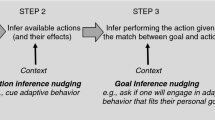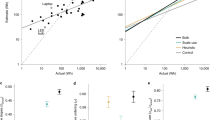Abstract
Current food choices have a high carbon footprint and are incompatible with climate goals. Transitioning to more environmentally friendly diets is therefore important. Behavioural ‘nudges’ have been widely used to reduce meat-based food demand, subtly altering choice presentation without banning or raising costs. However, scaling up nudges has proven challenging, sometimes raising ethical concerns. To address this, behavioural science proposes empowering individuals to reflect on their choices, fostering meaningful and more environmentally-friendly behavioural changes. In an experimental study with 3,074 UK participants, we compared three agency-enhancing tools (‘boost’, ‘think’ and ‘nudge+’) with classic nudges (opt-out default and labelling) to promote sustainable dietary intentions. All behavioural interventions increased intentions for sustainable foods but encouraging reflection on dietary preferences before defaulting people into greener diets yielded the best results. Adding a pledge before the default nudge, as in nudge+ (pledge+ default), additionally reduced emissions from intended orders of meals by 40%. Our research suggests that food companies can enhance their sustainability efforts by prompting customers to think before nudging them into consuming more sustainable food.
This is a preview of subscription content, access via your institution
Access options
Access Nature and 54 other Nature Portfolio journals
Get Nature+, our best-value online-access subscription
$29.99 / 30 days
cancel any time
Subscribe to this journal
Receive 12 digital issues and online access to articles
$119.00 per year
only $9.92 per issue
Buy this article
- Purchase on Springer Link
- Instant access to full article PDF
Prices may be subject to local taxes which are calculated during checkout



Similar content being viewed by others
Data availability
The datasets generated by the survey research during and/or analysed during the current study are available in Figshare at https://doi.org/10.6084/m9.figshare.23536983.
Code availability
The analytic codes used for data cleaning and analysis during the current study are available in OSF at https://osf.io/5by4k/?view_only=7011ecec70f94772b51a59f965c40a67.
References
Scarborough, P. et al. Vegans, vegetarians, fish-eaters and meat-eaters in the UK show discrepant environmental impacts. Nat. Food 4, 565–574 (2023).
IPCC: Summary for Policymakers. In Climate Change 2022: Impacts, Adaptation and Vulnerability. Contribution of Working Group II to the Sixth Assessment Report of the Intergovernmental Panel on Climate Change (Pörtner, H.-O. et al. eds) 3–33 (Cambridge University Press, 2022).
Byerly, H. et al. Nudging pro-environmental behavior: evidence and opportunities. Front. Ecol. Environ. 16, 159–168 (2018).
Lohmann, P. M., Gsottbauer, E., Doherty, A. & Kontoleon, A. Do carbon footprint labels promote climatarian diets? Evidence from a large-scale field experiment. J. Environ. Econ. Manage. 114, 102693 (2022).
Garnett, E. E., Marteau, T. M., Sandbrook, C., Pilling, M. A. & Balmford, A. Order of meals at the counter and distance between options affect student cafeteria vegetarian sales. Nat. Food 1, 485–488 (2020).
Jalil, A. J., Tasoff, J. & Bustamante, A. V. Low-cost climate-change informational intervention reduces meat consumption among students for 3 years. Nature Food 4, 218–222 (2023).
Thaler, R. H. & Sunstein, C. R. Nudge (Yale Univ. Press, 2008).
DellaVigna, S. & Linos, E. Rcts to scale: comprehensive evidence from two nudge units. Econometrica 90, 81–116 (2022).
Bovens, L. The ethics of nudge. In Preference Change. Theory and Decision Library, vol 42 (Grüne-Yanoff, T. & Hansson, S.O. eds) https://doi.org/10.1007/978-90-481-2593-7_10 (Springer, 2009).
Siipi, H. & Polaris, K. The ethics of climate nudges: central issues for applying choice architecture interventions to climate policy. Eur. J. Risk Regul. 13, 218–235 (2021).
Box-Steffensmeier, J. M. et al. The future of human behaviour research. Nat. Hum. Behav. 6, 15–24 (2022).
Chater, N. & Loewenstein, G. The i-frame and the s-frame: how focusing on the individual-level solutions has led behavioral public policy astray. Behav. Brain Sci. 46, e147 (2022).
Psychology Skills, Research Needed to Help Stem Climate Change (APA, 2022).
Banerjee, S. & John, P. Nudge plus: incorporating reflection into behavioral public policy. Behav. Public Policy https://doi.org/10.1017/bpp.2021.6 (2021).
Banerjee, S., Galizzi, M., John, P. & Mourato, S. Reflection before a nudge improves sustainable dietary choices. Evidence from an online randomised controlled trial. Figshare https://doi.org/10.6084/m9.figshare.23536983 (2023).
Hertwig, R. & Grüne-Yanoff, T. Nudging and boosting: steering or empowering good decisions. Perspect. Psychol. Sci. 12, 973–986 (2017).
John, P. et al. Nudge, Nudge, Think, Think: Experimenting With Ways to Change Civic Behaviour (A&C Black, 2013).
Loewenstein, G., Bryce, C., Hagmann, D. & Rajpal, S. Warning: you are about to be nudged. Behav. Sci. Policy 1, 35–42 (2015).
Bruns, H., Kantorowicz-Reznichenko, E., Klement, K., Jonsson, M. L. & Rahali, B. Can nudges be transparent and yet effective? J. Econ. Psychol. 65, 41–59 (2018).
Dold, M. F. & Lewis, P. A. A neglected topos in behavioural normative economics: the opportunity and process aspect of freedom. Behav. Public Policy 7, 943–953 (2023).
Banerjee, S., Grüne-Yanoff, T., John, P. & Moseley, A. It’s time we put agency into behavioural public policy. SSRN https://doi.org/10.2139/ssrn.4325117 (2023).
In Our Hands: Behaviour Change for Climate and Environmental Goals (UK House of Lords, 2022).
Carmichael, R. Behaviour Change, Public Engagement and Net Zero, A Report for the Committee on Climate Change (Imperial College London, 2019).
Bradt, J. Comparing the effects of behaviorally informed interventions on flood insurance demand: an experimental analysis of ‘boosts’ and ‘nudges’ Behav. Public Policy 6, 485–515 (2022).
Alacevich, C., Bonev, P. & Söderberg, M. Pro-environmental interventions and behavioral spillovers: evidence from organic waste sorting in Sweden. J. Environ. Econ. Manage. 108, 102470 (2021).
Galizzi, M. M. & Whitmarsh, L. How to measure behavioral spillovers: a methodological review and checklist. Front. Psychol. 10, 342 (2019).
Maki, A. et al. Meta-analysis of pro-environmental behaviour spillover. Nat. Sustain. 2, 307–315 (2019).
Dolan, P. & Galizzi, M. M. Like ripples on a pond: behavioral spillovers and their implications for research and policy. J. Econ. Psychol. 47, 1–16 (2015).
Truelove, H. B., Carrico, A. R., Weber, E. U., Raimi, K. T. & Vandenbergh, M. P. Positive and negative spillover of pro-environmental behavior: an integrative review and theoretical framework. Glob. Environ. Change 29, 127–138 (2014).
Banerjee, S., Galizzi, M. M., John, P. & Mourato, S. Immediate backfire? Nudging sustainable food choices and psychological reactance. Food Qual. Prefer. 109, 104923 (2023).
Shogren, J. F. & Taylor, L. O. On behavioral-environmental economics. Rev. Environ. Econ. Policy https://doi.org/10.1093/reep/rem027 (2020).
Stark, C. et al. Net Zero – The UK’s Contribution To Stopping Global Warming (Committee on Climate Change, 2019).
Nielsen, K. S. et al. How psychology can help limit climate change. Am. Psychol. https://doi.org/10.1037/amp0000624 (2021).
Behaviour Change Science and Technology Select Committee: 2nd Report of Session 2010–12 (UK House of Lords, 2011).
Maier, M. et al. No evidence for nudging after adjusting for publication bias. Proc. Natl Acad. Sci. USA 119, e2200300119 (2022).
Laffan, K., Lades, L. K. & Delaney, L. Paths that lead astray: examining the situational predictors of intention-behaviour gaps in meat consumption. J. Environ. Psychol. 89, 102045 (2023).
Mummolo, J. & Peterson, E. Demand effects in survey experiments: an empirical assessment. Am. Polit. Sci. Rev. 113, 517–529 (2019).
Attwood, S., Voorheis, P., Mercer, C., Davies, K. & Vennard, D. Playbook for Guiding Diners Toward Plant-rich Dishes in Food Service (World Resources Institute, 2020).
Kuruc, K. & McFadden, J. Animal welfare in economic analyses of food production. Nat. Food 4, 355–356 (2023).
Thaler, R. H. & Benartzi, S. Save more tomorrow™ : Using behavioral economics to increase employee saving. J. Polit. Econ. 112, S164–S187 (2004).
Pollan, M. Food Rules: An Eater’s Manual (Penguin Books, 2013).
Kahneman, D. Thinking, Fast and Slow (Macmillan, 2011).
Composition of Foods Integrated Dataset (CoFID) (Public Health England, 2021).
Scarborough, P. et al. Dietary greenhouse gas emissions of meat-eaters, fish-eaters, vegetarians and vegans in the UK. Clim. Change 125, 179–192 (2014).
Bloniarz, A., Liu, H., Zhang, C.-H., Sekhon, J. S. & Yu, B. Lasso adjustments of treatment effect estimates in randomized experiments. Proc. Natl Acad. Sci. USA 113, 7383–7390 (2016).
Young, A. Channeling Fisher: randomization tests and the statistical insignificance of seemingly significant experimental results. Q. J. Econ. 134, 557–598 (2019).
Acknowledgements
We thank colleagues at LSE (Department of Geography and Environment, The Grantham Research Institute on Climate Change and the Environment, Department of Psychological and Behavioural Sciences) and VU Amsterdam; R. Hertwig, T. Grüne-Yanoff, A. Schulze-Tilling and J. Picard for their feedback on earlier versions of the manuscript; the organizers and attendees of the following conferences, where the findings of this paper were presented: Royal Economic Society, University College Dublin, Annual Conference on Economics and Public Policy (Jindal School of Government and Public Policy), UK–China Workshop on Energy and Climate Change Economics (UCL and BIT), LSE Environmental Economics and Policy Seminar Series, OSWEET Seminar Series 2021 on Environment, Behaviour and Experiments, Brunel University (Health Economics and Public Policy seminar series), Max Plank Institute Berlin (Adaptive Rationality Centre), University of Birmingham (Department of Economics: TEDE and BEADS research group), Yale University on Climate and Food (GAUC 2021), University of Exeter Business School LEEP Seminar 2021, LSE Economic Geography Seminar 2021, UK Network of Environmental Economists Webinar Series 2021, SABE-IAREP 2021, Grantham Research Institute Behavioural Group, and the World Bank (The Mind and Development Unit). M.M.G. acknowledges funding support from the Department of Psychological and Behavioural Science, LSE. P.J. acknowledges funding support from the Department of Political Economy, King’s College London. S.M. acknowledges funding support from the Department of Geography and Environment, LSE.
Author information
Authors and Affiliations
Contributions
S.B. conceptualized the project, curated data, conducted formal analysis, conducted investigations, developed the methodology, administered the project, procured resources, developed software, performed visualization and wrote the original draft. S.B., M.M.G., P.J. and S.M. contributed to funding acquisition, project supervision, validation, and review and editing of the manuscript.
Corresponding author
Ethics declarations
Competing interests
The authors declare no competing interests.
Peer review
Peer review information
Nature Sustainability thanks Joshua Tasoff, Andrew Jalil and the other, anonymous, reviewer(s) for their contribution to the peer review of this work.
Additional information
Publisher’s note Springer Nature remains neutral with regard to jurisdictional claims in published maps and institutional affiliations.
Supplementary information
Supplementary Information
Supplementary Figs. 1–17, and Tables 1 and 2.
Rights and permissions
Springer Nature or its licensor (e.g. a society or other partner) holds exclusive rights to this article under a publishing agreement with the author(s) or other rightsholder(s); author self-archiving of the accepted manuscript version of this article is solely governed by the terms of such publishing agreement and applicable law.
About this article
Cite this article
Banerjee, S., Galizzi, M.M., John, P. et al. Sustainable dietary choices improved by reflection before a nudge in an online experiment. Nat Sustain 6, 1632–1642 (2023). https://doi.org/10.1038/s41893-023-01235-0
Received:
Accepted:
Published:
Issue Date:
DOI: https://doi.org/10.1038/s41893-023-01235-0
This article is cited by
-
Ethical Considerations When Using Nudges to Reduce Meat Consumption: an Analysis Through the FORGOOD Ethics Framework
Journal of Consumer Policy (2024)



